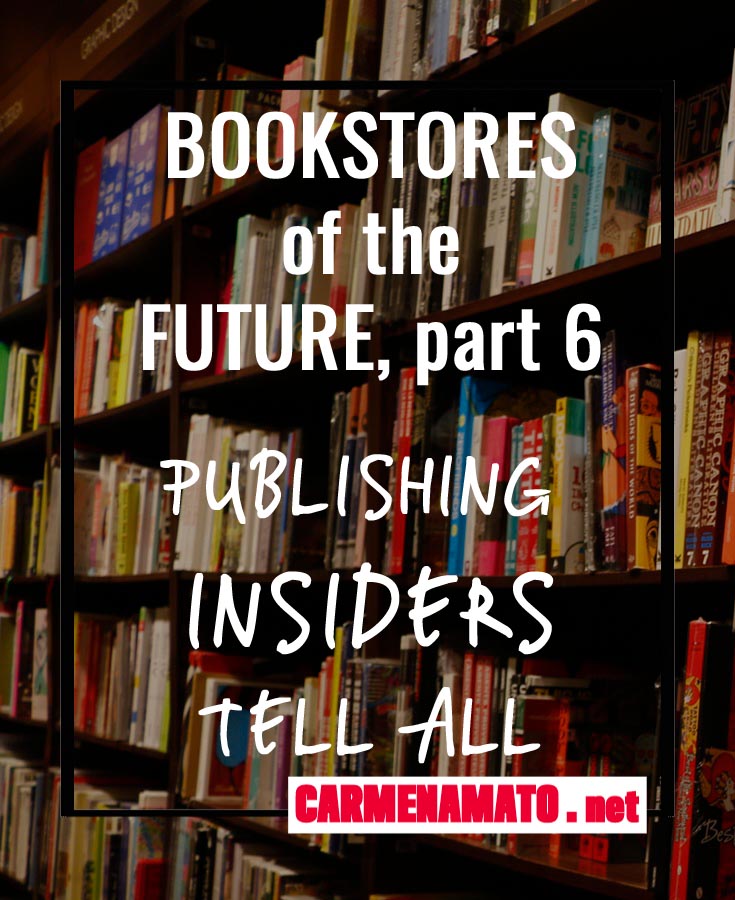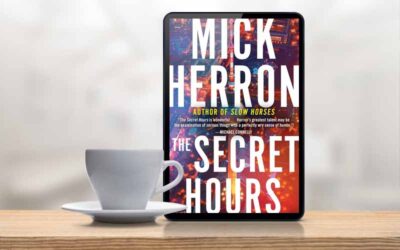
3 Comments
You may also like
Book Review: THE BONE RECORDS by Rich Zahradnik
THE BONE RECORDS by Rich Zahradnik is a wonderfully edgy “everyman” thriller but don’t expect a...
Large print edition of the Galliano Club historical fiction thriller series
New! Large print has arrived at the Galliano Club, where trouble is always on tap. Large print...
Book Review: THE SECRET HOURS by Mick Herron
The Secret Hours by Mick Herron is a must-read spy vs spy thriller. Like John le Carré’s A LEGACY...

CARMEN AMATO
Mystery and thriller author. Retired Central Intelligence Agency intel officer. Dog mom to Hazel and Dutch. Recovering Italian handbag addict.
Can publishing insiders predict the future of bookstores? What will stores look like in 10 years as they face competition from ebooks and ecommerce?
Over the past 6 months I’ve asked more than 800 people this question, including fellow authors, as well as book bloggers, marketers, and store owners. I’ve also followed the online debate fostered by many who have a large stake in the issue, notably those in the traditional publishing industry.
The result of my curiosity has been a series of articles. The first article, with 25 author comments, including those from thriller author Dale Brown and Guy Kawasaki, author of ENCHANTMENT, was a real eye-opener and my most widely shared blog post (I’ve stopped counting). Book bloggers presented more enlightening views, while the series has also explored book retailing innovation and potential partnerships.
This article, with widely divergent views from publishing insiders, raises the most questions out of all of the articles in the series so far. Many bash Amazon.com, without acknowledging that traditional publishing may be a “declining value proposition,” as economist Adam Gomolin ably put it. Others believe that the indie bookstore, with a couple of baristas and roots in the community, offers the best hope for continued bricks-and-mortar stores even while acknowledging that owners must become more savvy retailers. The age of owning a successful bookstore just because you love books is over.
Questions I thought would be hot topics for the publishing industry really weren’t in evidence: 1. How to change book distribution to improve cost structures for bookstores, and 2. How to get the growing number of independently published titles into physical bookstores?
Maybe the lack of big discussion is answer enough.
Note: comments listed in alphabetical order by commentator last name
Carolyn Burns Bass
founder and moderator of LitChat, a website devoted to reading and writing and #litchat Twitter discussions, email to author, 3 December 2013
www.carolynburnsbass.com and http://litchat.com
The writing is on the wall and the wall is electronic. As much as we love the smell of books, the turning of pages and beautifully designed typography, ebooks are the literary delivery devices of the future. Despite the convenience of ebooks, there remains, and will for a good many years, a devoted clientele for collector’s edition books and first editions. Publishers understand this and are even now responding with special designs such as wrap around covers for trade paperbacks, more deckle-edges and stunning interior designs. The bookstore of the future will feature these books, as well as kiosks such as the Expresso Book Machine for printing books on the spot. The bookstore of the future will have an agreement with publishers to get discount codes on ebooks their customers buy while logged into a bookstore’s wi-fi or from a local bookstore’s website. Successful bookstores of the future will cater to their patrons as a neighborhood deli serves its customers. They may not have every variety of salami, but they always have what their customers like best.
To survive against online book sales, bookstores can create alliances with other local businesses, such as a coffee/tea, juice or even a wine cart brought in during author visits. Bookstores of the future can be hubs of learning and culture, where people gather to buy books and talk about them. Of course, a bookstore is a logical place to host writing as well as reading groups, mini-TED-type talks, open mic readings by authors/poets, and other public discourse.
If this is not the bookstore of the future, then it’s my dream bookstore.
Carole Corm
publisher, Darya Press, 28 Jan 2014, email to author, www.daryapress.com
I don’t think I am the only person who misses their local bookshop. For the future, I am rather optimistic. I think bookshops could experience a renaissance.
Many people have remarked that the publishing industry is changing: beautiful, niche books continue to be published while the rest is delivered in the e-book format. In fact, there is already a market trend for well made books — whether cheap or high end. These volumes need a fitting space to be looked at – and bought. In a way, the whole Internet adventure is going to help bookshop owners up their game, offering only the best books, in an improved setting and with the kind of service and perks the Internet cannot compete with.
Doris Heilmann
publisher and blogger, email to author 22 Jan 2014, http://SavvyBookWriters.com/blog, http://www.111Publishing.com
How can bookstores innovate to stay competitive? Just a couple of ideas that pop in mind : )
1. e-Book Order Feature
Since years I was wondering why bookstores did not offer their customers devices where they could order the e-book version if they liked what they found in print in the store. Or at least “bundle” print books with an e-book version. Amazon now tries to partner with bookstores (which might meet some resistance…) to offer exactly what I had envisioned.
2. Carrying Author-Published Books
Trade-published books do not automatically mean quality. There are so many wonderful books from independent authors out there – and it would be a smart move to offer them as well. Readers don’t care who publishes a book, they just want a good read.
3. Order Directly from Author-Publishers
This way, bookstores could circum-navigate the wholesalers and increase their profit quite a bit! As these connections are mostly with local authors, the bookstores could play the “local” aspect into their promotions to the communities around. Most people like to “know” the author who’s books they buy.
4. Offer Book-Layout, Cover-Image and Editing
Why not band together with professionals and offer authors these services to make sure the books’ content and layout gets a great start and is prepared for the Espresso Book Machine. Many authors would be happy to get technical help in the book production and publishing process.
5. Set up an Espresso Book Machine
Many authors (professional and hobbyists) struggle to create very small numbers of print books, e.g. for book signings, Goodreads Giveaways or as gifts. Bookstores would be the ideal place to offer this inventive book printing device. Motto: “Get your book printed while having your Java”, which brings me to the next suggestion:
6. COFFEE! Most chain stores, such as B&N or Chapters have a Starbucks in a designated area, but very few bookstores offer this pleasure. Independent bookstores need to give customers more reasons to come in!
7. More Space and PR for Author Readings
Supporting events such as readings and book signings should be a priority of bookstores – and organizing these professionally, including PR, should be a no-brainer. After all it is a promotion for the store as well.
8. Providing Space for Author Meetings
Charging a small fee (as libraries do) and renting meeting space for authors or even organize a writers conference could be profitable and at the same time a good PR for bookstores if they have the space.
Hugh Howey
author and self-publishing advocate,“Is Amazon Saving Indie Bookstores?” 18 April 2014, http://hughhowey.com
I posited this during my keynote speech at the inaugural PubSmart conference here in Charleston, SC. And nobody threw anything at me. A few people came up afterward and wondered if there might be some merit to the idea. My thinking is this: The true enemy of independent bookstores has been the large chains like Barnes & Noble, Borders, and Waldenbooks, not online shopping. There was even a movie about this. Since the rise of Amazon, we’ve seen some of these chains shutter and many of the B&N stores close. Meanwhile, independent bookstores are experiencing near double-digit growth for three years running.
Is it possible that Amazon more directly competes with the large chains, and the independent stores are rising to reclaim their role in reading communities? I think so. Shoppers looking for discounts, or who know exactly what they need ahead of time, are using mouse clicks rather than driving to the big chain.
It’s also possible that the “shop local” movement, which is partly a response to the rise of discounters like Amazon, vastly benefits independent bookshops more than large chains. I know this works for me. I pay full retail for hardbacks at a mom-and-pop place but balk at 20% discounts from chains. Are there more shoppers like me?
Major publishers lambast Amazon, because they think the large chains are their main hope for the survival of brick and mortar bookshops. Independent bookstores (like the one I used to work in) go right along with the stone-throwing, assuming what’s bad for B&N and Borders must be bad for them as well. And yeah, I saw people scanning UPC codes and taking pics of books to buy online later. I also saw our sales numbers improve every year, partly because of our reorganization of the shop and our focus on customer service, but more because of the shuttering of WaldenBooks.
Amazon is knocking out the big predators. The indie bookshops are filling up some of that space.
Andrew Leonard
staff writer, “The independent bookstore lives! Why Amazon’s conquest will never be complete,” 4 Apr 2014, salon.com
Stop carving that gravestone. Brick-and-mortar bookstores aren’t dead, yet. On the contrary, independently owned bookstores are growing in number. According to the American Booksellers Association, since hitting a nadir in 2009, the number of indie bookstores in the U.S. has grown 19.3 percent, from 1,651 to 1,971. The current total is less than half the 1990s peak of around 4,000. But it still serves as a rebuke to the conventional wisdom that equates Amazon’s relentless rise with the inevitable death of the physical bookstore.
What explains this renaissance? The collapse of Borders in 2011 is one big piece of the puzzle. (Removing a dominant carnivore from the savannah gives all the other animals a little more breathing room.) The end of the recession also contributed to a more nurturing economic environment.
But there’s more to the story. There is increasing evidence that the same digital transformation that has so dramatically reshaped the publishing industry, and driven millions of consumers online, also paradoxically rewards locally rooted authenticity. Our digital tools are steering us toward brick-and-mortar stores that promise a more satisfactory consumer experience than either chain stores or online emporiums can provide.
In a world increasingly influenced by our social media interactions, it’s turning out there may well be enough room for the little guy to survive — and perhaps even thrive.
Michael Kozlowski
founder, GoodEReader.com, “The Future of the Traditional Bookstore in a Digital World,” 9 Sept 2013, goodereader.com
. . . Book discovery is central to bookstores and they invest significant time and money into aesthetics. Barnes and Noble, Indigo and WH Smith all have it down to a science on the art of product display and maximizing space to visually draw the eye. Your average best seller shelf is filled with vibrant colors and display stands hype up other notable authors or themes.
How will the modern bookstore change when by 2015 the amount of digital books sold will reach 50%? We have seen the collapse of Borders in the US, Whitcoulls in New Zealand and RedGroup in Australia. Thousands of small bookstores all over the world have also closed due to readers shifting to digital. How will bookstores transition from exclusively selling physical books to actively promoting eBooks?
The one worry many bookstores face is being a showroom for 3rd party eBook companies. This is evident in the relationship with bookstores that belong to the American Booksellers Association and sell books from Kobo. The indie bookstore makes very little commissions on each eBook and relies on selling physical books to stay in business. Barnes and Noble is the only one in the world with quite a large ecosystem of content and makes hefty digital returns.
Indigo, Chapters, WH Smith, Foyles and many other bookstores all sell tablets and e-readers in their stores. Over the course of the last few years, reading devices have been a boon to these stores and they are seeing modest returns. Indigo recently has been launching a series of Tech Zones, which significantly increases the size of their product display area. They now sell iPad, iPad Mini and an assorted array of new e-readers and tablets. When customers buy these devices, where do they go to buy books?
The bookstore of the future must develop their own eBook infrastructure in order to preserve their own identity and maximize profits. It is critically important that major chains develop their own digital bookstore and sell eBooks directly to their shoppers. It is simply not sustainable to encourage all of your patrons to buy the digital editions from Amazon or Apple There is always more money to be made by phasing out the middleman and reaching your audience directly . . .
In the end, bookstores need to develop their own bookstore and develop a series of apps for readers to use. These need to be loaded on any tablet or e-reader that their store carries. If the hardware vendor does not want to play ball, you ditch them. Bookstores sustain themselves from selling books, magazines and hardware. They need to unshackle themselves from a strict reliance on a 3rd party and bite the bullet and develop their own digital storefront.
Cat Lavoie
author and #ChickLitChat Twitter moderator, email to author, 22 Feb 2014, http://www.catlavoie.com/
Even though I’ve switched from reading paperbacks to (almost) exclusively reading ebooks, there’s nothing that compares to the joy of browsing in a bookstore. I think bookstores need to collaborate with indie authors and publishers in order to highlight local talent. Book signings and book club meetings could also be a good way to create buzz and introduce new authors to bookstore patrons. And readers who prefer their novels in digital form could download their copy directly from the store. In the end, I think that embracing the new technology and finding a way to bring authors and readers together is how bookstores will stay relevent for, hopefully, many years to come.
Judith Rosen
“The Check Is in the Mail: Patterson Sends Over $267,000 to Booksellers,” publishersweekly.com, 19 Feb 2014
Last September 2 in an interview in the Wall Street Journal followed by an appearance two weeks later onCBS This Morning, James Patterson announced his intention to give away $1 million to independent bookstores over the course of the next 12 months . . .
A little over five months later, Patterson has made good on his promise and mailed out the first installment of the funding this week, totaling more than $267,000, to 54 bookstores across the country plus the Northern California Independent Booksellers Association in support of California Bookstore Day . . .
In a phone conversation with PW earlier this week, Patterson stressed that this is only the first round . . . A doer by nature, Patterson describes himself as “the anti-Congress. We just do stuff.” For him, that “stuff” concerns not just the future of bookstores, libraries, and publishers, but of the next generation of readers. “The future of books in America is at risk,” he said. “Bookstore traffic is down. Kids aren’t reading as many books. I want to really shine a light and draw attention to the fact that this is a tricky time. The government will protect the automobile industry and the banking industry, but not books.”
Mike Shatzkin
founder of The Shatzkin Files, “The future of bookstores is the key to understanding the future of publishing,” idealog.com, 23 Jan 2014
It has been an unspoken article of faith that bookstores would not go the way of stores selling recorded music or renting and selling video, both of which are segments that have just about entirely disappeared. The physical book has uses and virtues that a CD, a vinyl record, a DVD, or a videotape don’t, not the least of which is that a physical book is its own “player”. But it also provides a qualitatively different reading experience, whereas the other “physical” formats don’t change the consumption mode at all. Of course, that only helps bookstores if the sales stay offline. People ordering books online are overwhelmingly likely to order them from Amazon. In other words, it is dangerous to use the book’s ability to endure as a proxy for the bookstores’ ability to sustain themselves. The two are not inextricably connected.
But the fate of almost all trade publishers is inextricably connected to the fate of bookstores. There are only two exceptions. Penguin Random House is one, because they are large enough to create bookstores on their own with just their books. The other is publishers who are vertical with audiences that open up the possibility of retail outlets other than bookstores. Children’s books and crafts books are obvious possibilities for that; there aren’t a ton of others.
The feeling I had at Digital Book World is that most people in the trade have either dismissed or are wilfully ignoring the possibility that there could be such serious further erosion of the trade over the next few years that it would threaten the core practices of the industry. With more than half the sales of many kinds of books — fiction in the trade area, of course, but also lots of specialized and professional and academic topics — already online, many seem to feel whatever “adjustment” is necessary has already been made . . .
All that is possible, and I have no data to refute the notion that we’ve reached some sort new era of bookstore stability, just a stubborn feeling in my gut that over the next few years it will turn out not to be true.
Oren Teicher
CEO of the American Booksellers Association, “A Year-End Letter From ABA CEO Oren Teicher” 12 Dec 2013, bookweb.org
. . . Nationally, the network of independent bookstores has seen and is continuing to see real, sustained growth. This vitality is the result of your hard work, innovation, and a commitment to selecting and showcasing titles that we passionately believe in and that we know will find readers in our communities.
A few years ago, I characterized this revitalization in conversations with our colleagues in the publishing community and in talks as a renaissance in indie bookselling. Today, that renaissance has become resurgence. When Publishers Weekly recently announced that it had selected me and the ABA Board as its person of the year, it was a wonderful acknowledgement of the collective achievement of all independent bookstores. As PW put it, “independent bookstores are once again seen as critical to the success of the book industry.”
. . . Believe me, I know you can’t pay your bills with press clips and that there will be many, many hectic hours before you make that last sale on December 24, but I hope that you can take a moment to appreciate that the public narrative about our industry has changed in a very critical way, as more consumers recognize the importance, vitality, and health of indie bookstores.
Kate Tilton
blogger and author assistant, 12 Feb 2014, via author website form, http://katetilton.com/
How can bookstores innovate to stay competitive?: Bookstores have to compete in prices. If it is cheaper to buy a book of equal quality but for a fraction of the cost elsewhere bookstores are going to lose. As much as I love a nice bookstore the convenience of online shopping and money saved makes it very tough for bookstores to stay open. Author events are one of the only things I make the trek out to a bookstore but author events can happen in other places too (libraries, coffee shops, churches). In order for bookstores to innovate they need to find a way to win over readers once again.
Michael Weinstein
“Reports of the Bookstore’s Death Are Greatly Exaggerated,” bookbusinessmag.com, 13 May 2013
. . . Part of me wants to suggest that we take the emotional hot button of the “nobility” of the bookstore (particularly the local independent variety) out of the discussion and just talk cold/hard facts. But I don’t think we can. I think there are enough people out there that see (and feel) the value of the experience (as Sturdivant wrote), who want and NEED bookstores to exist, to contribute enough to keep them going.
But I also think that from a business sense, publishers see the value of bookstores. They may sell more books at Amazon, but publishers are smart enough (I hope) to recognize that independent stores can help “make” a book if they like it, that author readings and signings build loyalty . . .
Also, we need to continue to expand the definition of “bookstore.” Obviously, most bookstores won’t be “just” bookstores. In fact, books may not be the primary function of the store, but that won’t mean that they’re not bookstores. What each store offers other than books will depend on the owners — how smart are they? How in touch are they with what their local community needs? The physical store allows a community to be built around events and activities, and that is more potent than an online community. Sure, I’m in an online community of Wheaten Terrier owners, but talking online and sharing pictures with someone from Norway is just not the same as sitting in a room with your physical neighbors . . . .
Like everything else in our industry it will require ingenuity, flexibility and the ability to adapt on the go to succeed.
Tom Weldon
UK chief executive of Penguin Random House, as quoted by Jennifer Rankin in The Observer, 5 April 2014
Some commentators say the publishing industry is in enormous trouble today. They are completely wrong, and I don’t understand that view at all . . . Book publishers have managed the digital transition better than any other media or entertainment industry. I don’t understand the cultural cringe around books . . .
It is a sad fact of life that there are fewer physical bookshops than there were. [Traditional media is declining, including books pages. As the book world moves from] “a browse-and-display model to one of online search and recommendation, publishers must adapt to capture readers attention. The challenge isn’t digital: it is how do you tell people about the next great book.







Thank you for featuring my comments! I’d like to say also that I have seen bookstore that compete well with online stores by hosting fabulous author events or by creating unique experiences that make the extra money and travel well worth it.
I think this is something I’ll talk about more on my blog soon. It is such a wonderful topic. Thank you for the inspiration!
Kate, thanks so much for contributing to the series. There is going to be a Twitter #LitChat on Monday on the topic. Would love to have you join in. Check the hashtag to verify the time.
Ah sorry I missed this! It would have been a lot of fun.